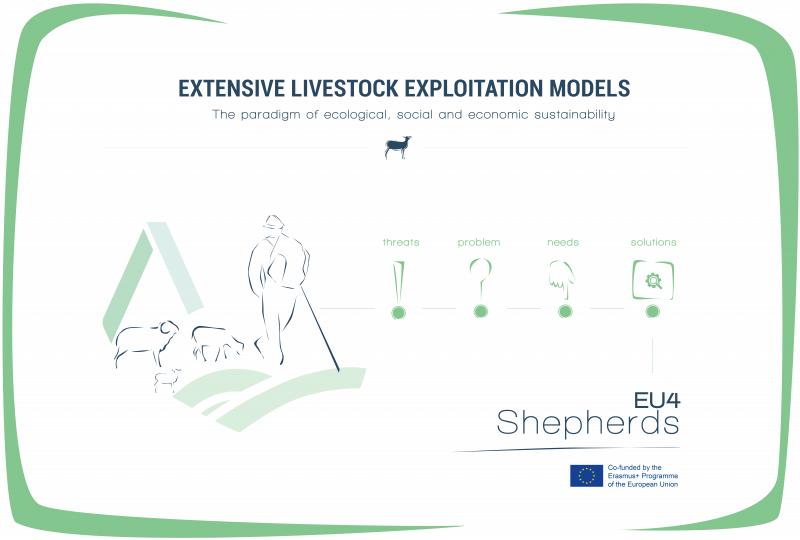EU4Shepherds, Innovative training for sustainable shepherds. International Erasmus project

Extensive livestock exploitation models are crucial for the sustainable maintenance of important rural areas in Europe. These models are the paradigm of ecological, social and economic sustainability. These models fight against depopulation in rural areas and have a positive impact in animal wellbeing and human health compared to other non-extensive models. These models supply consumers with quality foodl products in many EU territories and promote the sustainable development of our society.

The future of such livestock exploitation models, currently under threat due to the effects of climate change and administrative barriers (droughts, animal health problems, increase in parasites, administrative limitations for transhumance, etc...) depends on the availability and capacity of extensive Shepherds. But the problem is that it is increasingly difficult to find well trained shepherds that have the knowledge and experience to face all the aspects involved in extensive livestock shepherding. Shepherds are an ageing social group, the younger ones lack proper training, education and experience and nowadays there is no motivation to become a shepherd due to the low social standing and lack of a specific professional training offer and The shepherds – key actors and basis for extensive livestock – carry out innumerable functions in rural, disadvantaged and under populated areas.

Although they are an important element in rural societies, shepherds lack social recognition, and they don’t have access in many cases to a well-structured, methodical and validated training for the sustainable management of extensive exploitations. The project idea arises after a need analysis of the current situation, being the most important problems, among others:
- Difficulties to find professional shepherds.
- Lack of more structured and updated training and education offers adapted to current needs and threats, as well as adapted flexible training tools for current or future Shepherds.
- Lack of motivation to become a shepherd.

EU4Shepherds seeks to improve and update the training offer for extensive shepherds taking into account current barriers (administrative mainly…) threads (new climate scenario and its consequences) and opportunities (ecological production trends, agro tourism, etc…) to ensure a sustainable maintenance of extensive livestock exploitations (economical, social and environmental) giving them tools to become resilient. The project will adapt the training methods (both for trainers and trainees) for a work-based learning taking into consideration current barriers and logistical problems for extensive shepherds (many of them are distributed along rural isolated areas) in order to ensure the sustainability of the profession and of extensive livestock exploitations. Furthermore, the project will provide a training platform designed for extensive shepherds (not used to complicated interfaces or texts) and will promote the use of digital tools for training.
These objectives will be satisfied with the development of three IOs:
- New curricula for professional shepherds.
- New flexible training methodology for trainers.
- New on-line adapted training platform for extensive shepherds
Although Shepherds are the main objective of the project, we can say that trainers involved in the training of extensive shepherds are the key element for making possible the needed change in the training of professional shepherds, and therefore, trainers are the main target group of key project actions (IOs and training workshops).














